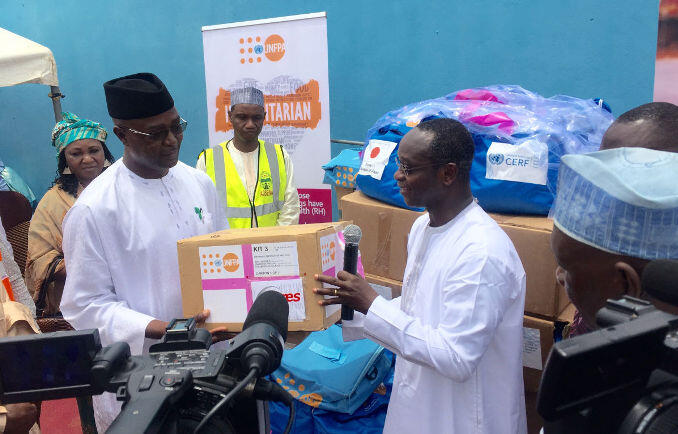The United Nations Population Fund (UNFPA) in partnership with the Government of Japan and the United Nations Central Emergency Response Fund (UN-CERF) has flagged off the distribution of 11, 000 dignity kits to survivors of insurgency in North East Nigeria and 256 comprehensive reproductive health kits to medical facilities, including clinics in the internally displaced persons (IDP) camps to respond to their reproductive health needs.
“Many of us here today, have easy access to reproductive health services, but for a survivor of insurgency in an IDP camp, these needs are not easily met”, said Ratidzai Ndhlovu the UNFPA representative in Nigeria. “The comprehensive reproductive health kit distributed today will provide contraceptive services for women of reproductive age, commodities for pre-natal, safe delivery and post-natal care for pregnant women, treatment of sexually transmitted diseases (STI’s) including the prevention of HIV/AIDS and the clinically management of rape”. This support is part of a UNFPA plan to restore access to essential reproductive health services to about 4.5 million people affected by the humanitarian situation in the North East.
In addition to health kits, the peculiarity of the female gender demands that she has some basic necessities to preserve her dignity. These needs go beyond health, food and shelter to the procurement of commodities that strengthen her self-esteem in a time of crisis. To the vulnerable women and girls in a humanitarian setting, these needs include sanitary towel, soap, toothpaste, underwear, new clothes, infant blankets and others. The 11, 000 UNFPA dignity kits co-funded by the Government of Japan under the project “strengthening sexual and reproductive health service provision in conflict affected communities in North-East Nigeria” and the UN-CERF will address these needs.
UNFPA has responded relentlessly to the humanitarian situation in Nigeria. In 2014, it initiated a scale-up of its ongoing response in the North East, to target a caseload of about 4.5 million people. So far, the Fund has reached 3.57 million people, assisted the safe delivery of over 39,507 pregnancies in supported health facilities. Some 310 survivors of sexual violence have also been treated in the UNFPA assisted facilities. In addition, 22,000 dignity kits have been distributed to vulnerable IDP women and girls and host communities.
The Adamawa State Emergency Management Agency (ADSEMA), acknowledged the leading role UNFPA plays in the ongoing humanitarian response in Nigeria. “UNFPA has been at the forefront of humanitarian interventions not just in Yola, Adamawa State but in Nigeria. The Fund’s response started in 2012, after the flood crisis and it has remained a dependable partner in emergencies” said Mr. Faro Haruna, the Permanent Secretary of ADSEMA, who was represented by Dr. Suileman Mohammed.
The United Nations Population Fund renews its commitment to cooperate with the people and Government of Nigeria to deliver a world where every pregnancy is wanted, every childbirth is safe and every young person’s potential is fulfilled.


